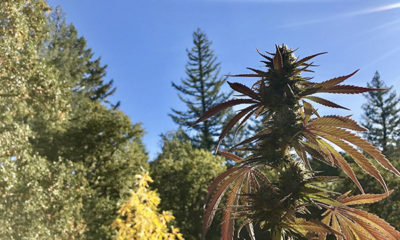
Joint Opinions
Midterm Elections Show Marijuana Is a Bipartisan Issue
On Tuesday, as the GOP gained a majority control of both the U.S. House and Senate, voters in Oregon, Alaska and Washington, D.C. legalized the recreational use of marijuana, the territory of Guam legalized medical marijuana and the hard-fought battle for medical cannabis in Florida was narrowly lost with 58.5 percent of voters approving Measure 2 and 43 percent opposed. Unfortunately, Measure 2 needed a two-thirds majority (60 percent) vote to pass.
Similar anti-Drug War and pro-cannabis measures and candidates passed in almost every other local election, including the passage of California’s Proposition 47, which deals considerable blows to both the Drug War and prison system in the state.
The last time a marijuana legalization initiative was on a midterm election ballot was 2010 in California. Proposition 19 would have legalized recreational cannabis in the state, but found considerable opposition from within the well-ingrained medical marijuana industry due to specifics of the bill. Many analysts also noted that a presidential election year would have been a wiser time to put up such a ballot measure because younger more pot-friendly voters rarely turn out for midterm or primary elections. Clearly, in 2014, this is no longer the case.
According to Pew Research, about 37 percent of registered voters usually turn out for midterm elections, with 54 percent turning out to vote in a presidential election. The important thing to note is that of the 37 percent of registered voters who vote during a midterm election, many are older and white — a demographic that tends to vote conservative.
And yet, with cannabis being seen as a “liberal” cause, the results paint a different picture. On Tuesday, the Republicans took seven U.S. Senate seats and 14 House seats from the Democrats, giving them full control over Congress for the next two years. The exact same voters legalized marijuana or approved it as a majority, even in Florida where it lost. Cannabis has clearly become the one true bipartisan issue in a nation seriously divided.
Take for example, the state of Alaska. Tuesday’s elections yielded a win for Republican incumbent Don Young who beat Democrat Forrest Dunbar 51-40. In Alaska’s senate race, Republican Dan Sullivan beat Democratic incumbent Mark Begich 49-40. At the same time, Alaskan voters approved recreational marijuana by 52-48, a larger majority than for either winning Republican candidate. In a state where Republicans won big, marijuana won bigger. Conservative Republican voters clearly wanted this just as much as liberal Democrats.
Democrats largely ignored the issue going into the midterms, many were still afraid of the implications of “coming out” as pro-cannabis. Hopefully this week, in the reflective sobriety of lost elections they will recognize that their failure to embrace the issue of legal medical and recreational cannabis may have been what done them in. Republicans, Democrat, Libertarian and Independent voters have sent a unified message — it’s time for legal marijuana.
With reports coming out Colorado, where legal recreational sales began in January, early predictions indicate that the state may profit $30 million or more just in legal marijuana tax revenue this year. It is clear the financial incentive towards legalization has swayed a lot of voters.
Earlier this year, President Obama indicated he had no intention of making a federal move on cannabis because he believes it is a states’ rights issue. He has also laughed at the question repeatedly in public forums. Obama also became a pretty big punching bag for both parties’ candidates in campaign rhetoric this year. Obama missed the mark on marijuana — perhaps recreational marijuana appears to be a states’ rights issue to those unfamiliar with (or willfully ignorant about) the true implications of the Drug War, but both medical and recreational marijuana legalization is absolutely a human rights issue and shouldn’t be dealt with state-by-state by voters and the corporate donors who influence them.
Marijuana is absolutely a medicine and science proves it. All humans come equipped with an endocannabinoid system, a network of receptors found throughout the body that regulate functions such as pain, sleep, digestion, appetite, inflammation and mood. These receptors bind with endogenous cannabinoids produced in the human body to regulate these processes. One of these endogenous cannabinoids, anandamide, is what is responsible for the high felt after rigorous exercise, more commonly know as “the runner’s high.” Anandamide happens to be strikingly similar in structure to the phyto (or plant) cannabinoid THC and binds to the same receptors performing the same functions. Other cannabinoids are being studied with these receptors and are producing similar results — plant-sourced cannabinoids work the same as the ones humans already produce to regulate so many essential human functions.
Patients who use cannabis already know this — whole plant marijuana is an extremely effective medicine to treat conditions for which the endocannabinoid system regulates. Why then has medical marijuana been relegated to the realm of political? In Florida, patients will now continue to suffer and risk their freedom to obtain black market cannabis because 43 percent of voters don’t “believe” in marijuana as a medicine.
So, while the dominoes of medical and recreational legalization continue to fall in the United States, a larger message must be sent to legislators — this issue is no longer a joke, the marijuana voting block is real and it is time to treat prohibition like the human rights issue it truly is. It is time for the federal government to reschedule because the bipartisan support is here, it’s real and it’s only going to continue to grow.
Do you agree? Is marijuana a human right? Tell us in the comments below.























